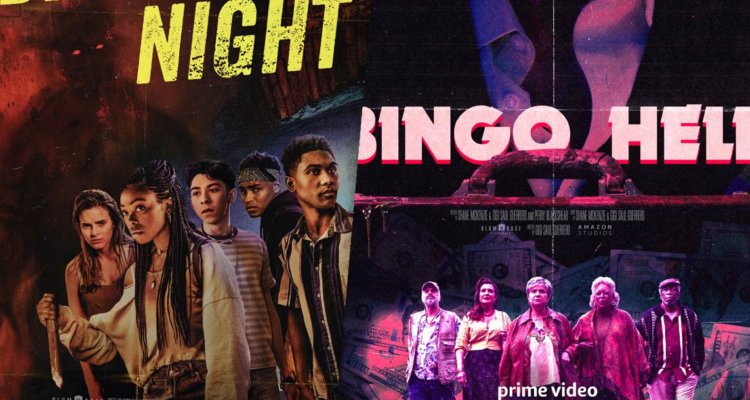“Into the Dark” may be over, but Jason Blum and his Blumhouse company aren’t done delivering original horror films to streaming subscribers who are looking for something new this spooky season. Following the quartet of releases from last October under the “Welcome To the Blumhouse” banner that included “The Lie” and “Nocturne,” two films that gathered a reasonably strong social response primarily due to their young casts and memorable twists, Amazon Prime Video offers a second slate of original movies for fans with two dropping on October 1 and another double feature landing on October 8. (Come back next week for reviews of those.) As usual, Blumhouse’s low-budget/high-concept production system leads to a very hit-and-miss track record, and the bad news is that both of the first two offerings in the 2021 edition of “Welcome to the Blumhouse” fall on the miss side of that ledger, although one more drastically than the other.
READ MORE: The 50 Best Horror Movies Of The 21st Century So Far
“Bingo Hell”
The better of the two movies taking up residence in this twisted Blumhouse comes from a veteran of the company’s Hulu series, director Gigi Saul Guerrero (who co-writes here with Shane McKenzie and Perry Blackshear). The talented Guerrero helmed arguably the best installment in “Into the Dark,” the sharp, memorable “Culture Shock.” She brings a similar broad horror/comedy tone laced with social justice to “Bingo Hell,” which features a pair of fun B-movie performances at its center but gets a bit lost in its own ideas about gentrification and dreams of a better life. Both films this week feature muddled attempts at sociopolitical commentary, and Guerrero’s works best when it avoids the questionable argument that wanting to escape poverty means someone is betraying their roots. She has a slick sense of visual humor that keeps “Bingo Hell” humming for about an hour, especially because she again works with horror legends who seem to get the assignment, but it all kind of comes apart in the final third when she loses grip on the tone, and no one ends up winning this convoluted game.
READ MORE: The 25 Most Anticipated Horror Movies Of 2021
Oscar nominee Adriana Barraza (“Babel”) plays the feisty Lupita, an outspoken activist who rails against the gentrification that’s destroying her beloved Oak Springs neighborhood. However, something much more dangerous than hipster coffee shops rolls into town in a fancy new car with the license plate that reads “Big Winn3r.” Behind the wheel is a Faustian figure (horror legend and Rob Zombie regular Richard Brake, perfectly cast), who turns Lupita’s traditional bingo night into a Hellish deal with the devil, playing off the ostensible greed of the people of Oak Springs. Turning the bingo hall into a flashy casino, he promises to make everyone’s financial dreams come true. Of course, it all comes with a brutal cost, one that’s amplified by flashy, surreal cinematography from Byron Werner.
It feels likely that Guerrero would call herself a fan of “Tales from the Crypt” in that both “Bingo Hell” and “Culture Shock” have that broad, horror/comedy style that would make the Cryptkeeper cackle. And there’s a version of “Bingo Hell” that totally works at half the running time but managing that kind of satirical tone for 85 minutes proves a bit too much of a challenge, especially when “Bingo Hell” starts taking itself a bit too seriously. The dialogue about escaping lives of violence verges on “A Very Special Episode” degrees of preaching and cliché. The film works when Barraza and Brake are allowed to go all-in but comes up just short of being called a winner when it takes itself a bit too seriously. [C+]
“Black as Night”
If “Bingo Hell” avoids its tonal problems for most of its running time, the superficial messaging and paper-thin characters of “Black as Night” derail it from pretty much the very beginning. Maritte Lee Go directs a shallow script by Sherman Payne that tries to be a coming-of-age story, a commentary on the social issues that plagued New Orleans before and after Katrina, a sociopolitical examination of class and race, and a vampire movie, all at the same time. And it doesn’t commit enough to any of it. For a similar streaming horror film about bloodsuckers with a modern edge, check out Netflix’s “Vampires vs. the Bronx,” which does just about everything this film tries to do, only funnier, scarier, and smarter.
“The summer I got breasts—that was the same summer I fought vampires,” says Shawna (strong newcomer Ashja Cooper, whose potential breakthrough work here is the only reason to watch and who also appears in Netflix’s upcoming “There’s Someone Inside Your House”). Shawna has a lot bigger problems than puberty, including an addicted mother who has crossed paths with a creature of the night, a vampire King (Keith David) who is turning the unwanted people of the Bayou into his own army. Shawna and her BFF (Fabrizio Guido) bring all the classic tricks of Buffy’s trade that they’ve been taught over the years (garlic, silver, sunlight, etc.) to try and stop him from destroying his own people.
A chaotic mishmash of ideas searching for a movie, “Black as Night” suffers significantly from truly awkwardly amateurish dialogue and performances. It’s a film with enough strong ideas (and a charismatic lead) that the clunky plotting, leaden visuals, cheap effects, and eye-rolls of social commentary shoehorned into its dialogue make for a frustrating experience. If “Black as Night” had leaned into its feisty YA concept a bit more, it might have worked, but it’s a film that feels like it wants to be everything—a bit of “Get Out,” a bit of “The Lost Boys,” and a lot of “Buffy the Vampire Slayer.” And yet, it’s never as much fun as that melting pot of concepts should be, blending all of its many colors into something that’s far too gray. [D+]

